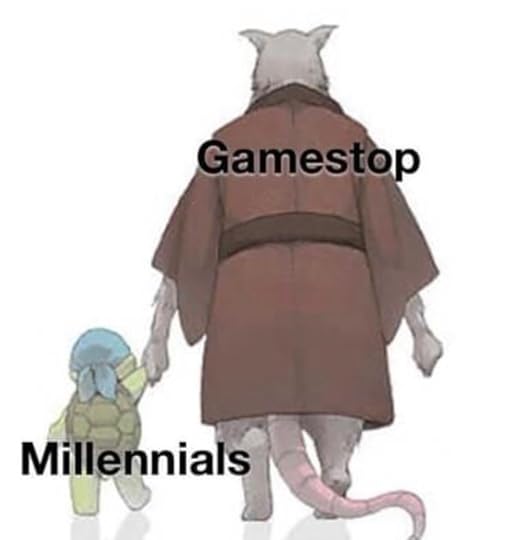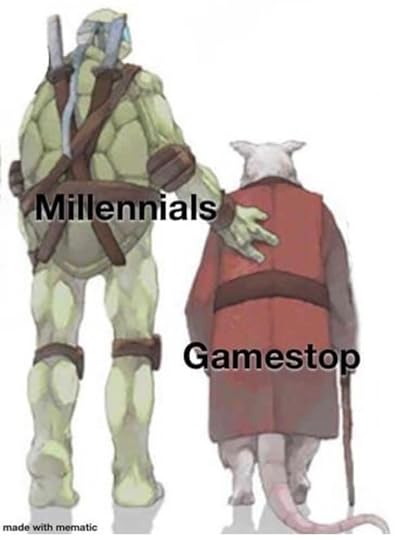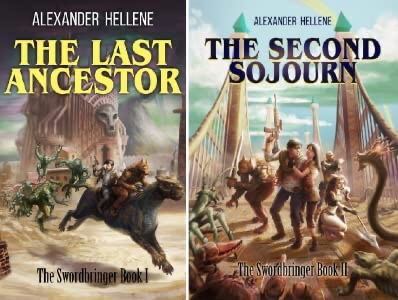Physical Media Rules

GameStop-mania got me thinking about how much physical media rules (among other things). But the news wasn’t the only thing that got me on this train of thought lately.
My son found a bunch of my old video game stuff in the basement, games and manuals, mostly old PlayStation, Game Boy, and DS games. My son was as enchanted with old game manuals as much as I am. There was something about opening a game box and getting a lavishly illustrated manual that took time and detail to not only tell you how to play the game, but to give tidbits about the story that could actually help you out.
I’ll never forget when my friend Danny and I were playing StarTropics on the Nintendo when we were eight or nine, and actually had to dip the letter from the main character Mike’s uncle to Mike that came with the game into water to reveal a secret code needed to advance in the actual game. Or using the manual to old Sierra adventure games to progress, like the spell recipies and incantations in King’s Quest III or proper police procedure in the original Police Quest. Or the strategy guide and map that came with the original Final Fantasy. Or the care and humor that went into every Quest for Glory manual (along with the really nice paper they were printed on!). Or the sheer whimsy and attention to detail in every old Dragon Warrior/Dragon Quest or The Legend of Zelda manual.
You get the point. It’s such a shame that games don’t come with manuals anymore and just have in-game tutorials or tell you to just look online.
Having a thing is fun. I’m like that with music and books. Though downloading albums and books onto a Kindle or other device is convenient and often cheaper, album and book artwork and a physical, tangible thing can’t be replaced. Someone took the time to put these songs in this order for you, and include this imagery on the cover and interior of the disc, along with photographs and maybe lyrics. A book had this cover for a reason.
These things enhance the experience more than faster download times. They also make the creative work you are about to enjoy feel real.
More than that, it prevents the powers that be from deleting parts or wholes of things that become objectionable as fashionable morality changes. History is hard to rewrite when there are pristine copies of a thing safe from digital manipulation.
Remember when the hippies were worried about Christians to erase problematic content?
I’ve discussed how I still enjoy buying CDs and listening to them when I can. Truth be told, if all of my CDs weren’t still in unorganized boxes in the basement, I’d use them instead of my trusty over-a-decade-old iPod that has the vast bulk of my music on it.
I still prefer to purchase physical copies of any video games over digital downloads for this reason, and one of these days I’ll buy all of the books I’ve downloaded on my Kindle that I deem worthy to be in my personal library (coming soon!).
The GameStop situation, along with that of AMC, has a relatively unreported dimension: the soullessness of modern culture as we march deeper into the 21st century has unearthed a powerful nostalgia for–wait for it–big box retailers and mall culture.
Would anyone ever have guessed that people would pine for the days when you actually had to go to a store instead of the convenience of purchasing something ephemeral with a click? I thought about this during a recent visit to GameStop with my son, and another to our fantastic local comic store/”pop culture emporium,” the interior of which is the featured image of this post. At a store, you can browse for things you my not have heard of before, or weren’t necessarily looking for, and discover new stuff by accident. Maybe it’s overhearing another customer speaking, or people working at the store, and asking them what they think of this album or that book or game. Maybe you bump into a friend. Maybe you make a friend.


Who knows? The fact is, you cannot do this stuff online. Internet relationships have potential to be strong, but there is no substitute for the connections made in real life, making the effort to actually go hang out with other human beings the way my generation still did until the advent of the Internet in our late teens and early twenties.
So-called “mall culture” and the big box retailers were derided at the time for replacing the local mom n’ pop whatever and other characteristic community retailers in place of a homogenous, bland corporate culture. And that is still a valid criticism. But compared to what we have now, the “bland corporate culture” of the late 1990s/early 2000s seems like a shining beacon of community to subsequent generations raised on nothing but being Very OnLine Youth.
And these criticisms also neglect the fact that actual communities and cultures were still allowed to develop when the shopping mall was a safe place to hang out and do things outside of adult supervision and hadn’t been turned into decaying warzones or places where that sort of discovery and freedom are discouraged. How many malls have arcades anymore, for example? They’re usually full of relatively high-end stores that smell like lots and lots of expensive perfume.
Does any of this have anything to do with r/WallStreetBets’s attempted takedown of big hedge funds? I don’t know. Maybe. Perhaps there was some residual anger at the hedge funds’ decision to short these particular stocks. I haven’t researched the issue myself, but it’s interesting to think about, especially as my own son finds himself really enjoying products of the past, not due to any sense of personal nostalgia, but because those products are just really good.
Naturally, the counterargument is “Not everything from the past was good, and not everything from the present is bad.” And that is absolutely correct! But in a culture where everything is increasingly revealed to be utterly fake, human connection is one of the last remaining bastions of realness around in the physical world we all live in, regardless of one’s spiritual beliefs. It does my heart proud to see my son enjoy just walking through shelves of books or games or anything else and enjoy the experience of looking around and talking to other people who share his interests.
Physical media rules.
Feel free to buy physical copies of my books. Check out those amazing covers!




